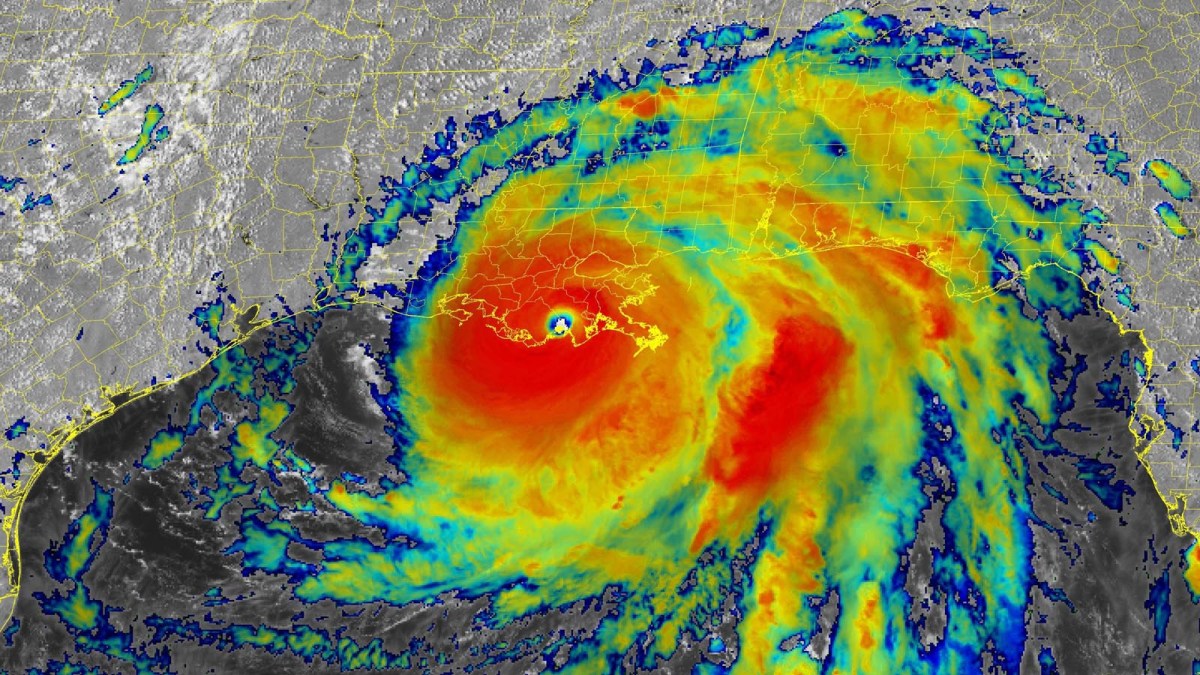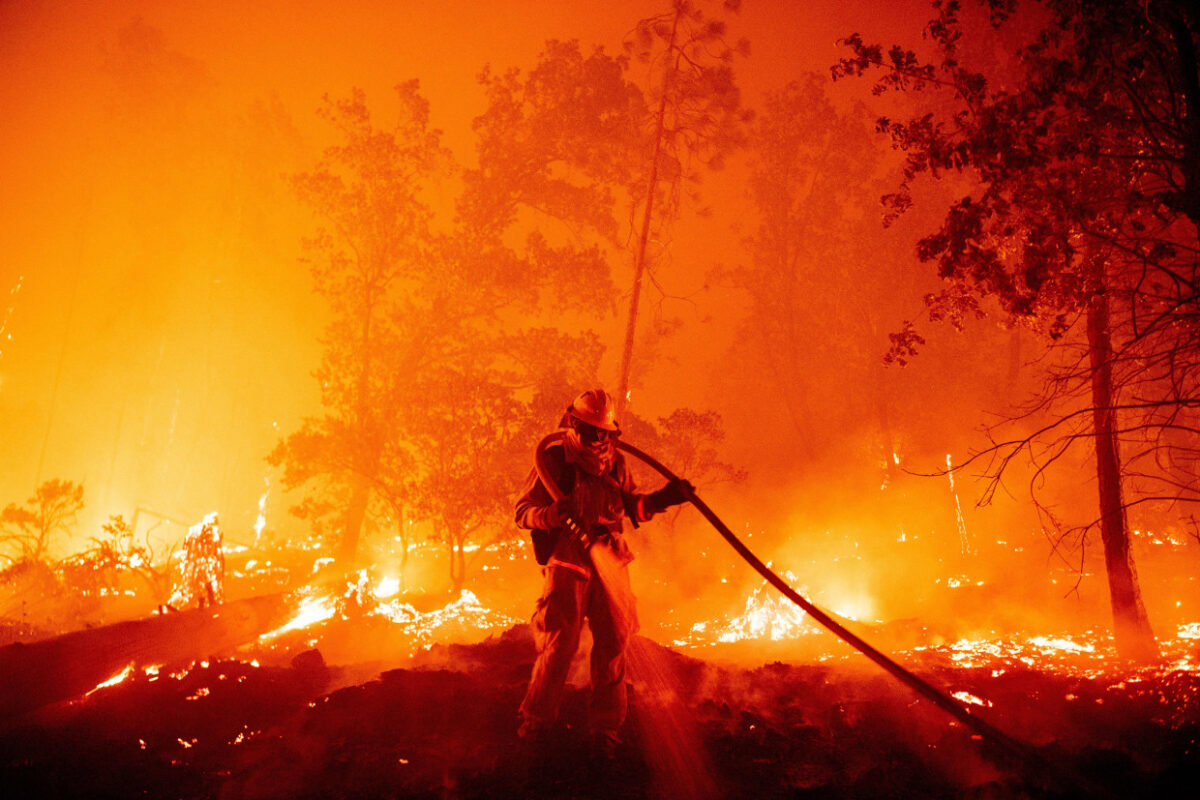85 percent of the global population has experienced weather events made worse by climate change –

Infrared satellite image of Hurricane Ida at 3:21 p.m. EDT August 29, 2021, after making landfall near Port Fourchon, Louisiana: NOAA
By Glynn Wilson –
WASHINGTON, D.C. — Two new science reports out Monday show that climate change is leading to major health threats against humanity and that at least 85 percent of the global population has experienced weather events made worse by climate change.
A new report released by the World Health Organization on Monday, reported first by CBS News, warns that climate change is the “single biggest health threat facing humanity.”
The report points out that climate change is already impacting the lives and health of millions of people in various ways, and that while “no one is safe from these risks,” people in low-income communities are most vulnerable.
The threats include harm or death from increasingly frequent extreme weather events such as heat waves, storms and floods, as well as the disruption of food systems, the spread of diseases from animal populations, food- and water-borne illnesses, related mental health issues and more.
“The COVID-19 pandemic has shone a light on the intimate and delicate links between humans, animals and our environment,” WHO Director-General Dr Tedros Adhanom Ghebreyesus said in a news release. “The same unsustainable choices that are killing our planet are killing people.”
Over 150 organizations and 400 experts and health professionals were consulted on the report’s list of 10 recommendations for governments to help address the climate crisis and its impact on health. These include reimagining urban environments and transit systems; promoting “healthy, sustainable, and resilient” food supply systems; and committing to a “healthy, green, and just recovery” from COVID-19 that includes global access to vaccines and steps to help prevent future pandemics.
In September, WHO tightened its global air quality guidelines in its first revision since 2005. The organization said air pollution is one of the “biggest environmental threats to human health.”
The findings come ahead of the U.N.’s major international conference on climate change, known as COP26, which gets underway October 31 in Glasgow, Scotland.
Climate change is resulting in poorer health outcomes, increasing mortality and is a driver of health inequities. However, health is well placed to be a significant part of the solution; the positive health impacts from stronger climate change action can motivate stronger global ambition; health systems which are resilient to climate change can help protect their populations from the negative impacts (in the short and longer terms); and sustainable low carbon health systems can make a substantial contribution to reducing national and global emissions.
Health has been chosen as a science priority area. The COP26 Health Programme has been established to bring stronger health focus and ambition to the conference. The key health priorities for COP26 include:
* Building climate resilient health systems;
* Developing low carbon sustainable health systems;
* Adaptation Research for Health;
* The inclusion of health priorities in Nationally Determined Contributions,
* And raising the voice of health professionals as advocates for stronger ambition on climate change.

A firefighter douses flames as they push towards homes during the Creek fire in the Cascadel Woods area of unincorporated Madera County, Calif.: Josh Edelson
In another report published Monday in the journal Nature Climate Change, first reported on by The Washington Post, research shows that at least 85 percent of the global population has experienced weather events made worse by climate change.
After using machine learning to analyze and map more than 100,000 studies of events that could be linked to global warming, researchers paired the analysis with a well-established data set of temperature and precipitation shifts caused by fossil fuel use and other sources of carbon emissions.
These combined findings — which focused on events such as crop failures, floods and heat waves — allowed scientists to make a solid link between escalating extremes and human activities. They concluded that global warming has affected 80 percent of the world’s land area.
“We have a huge evidence base now that documents how climate change is affecting our societies and our ecosystems,” said lead author Max Callaghan, a researcher at the Mercator Research Institute on Global Commons and Climate Change in Germany.
The study provides hard numbers to back up the lived experiences of people from New York City to South Sudan. “Climate change,” Callaghan said, “is visible and noticeable almost everywhere in the world.”
The findings come amid a major push to get countries to commit to more ambitious climate goals ahead of a United Nations summit in Glasgow, Scotland, next month. Research shows that existing pledges will put the planet on track to heat up about 2.7 degrees Celsius (4.9 degrees Fahrenheit) by the end of the century — a level of warming that would lead to drastic food and water shortages, deadly weather disasters, and catastrophic ecosystem collapse.
Some of the world’s top emitters, including China and India, have yet to formally commit to a new 2030 emissions reduction target. Activists worry that an emerging energy crisis, which has raised prices and triggered blackouts, could imperil efforts to get developing economies to phase out polluting fuels.
In the United States, climate disasters have already caused at least 388 deaths and more than $100 billion in damage this year, according to analyses from The Washington Post and the National Oceanic and Atmospheric Administration.
Yet despite a pledge to halve emissions by the end of the decade, congressional Democrats are struggling to pass a pair of bills that would provide hundreds of billions of dollars for renewable energy, electric vehicles and programs that would help communities adapt to a changing climate.
The contrast between the scope of climate disasters and the scale of global ambition is top of mind for hundreds of protesters who have descended on Washington this week to demand an end to fossil fuel use.
“How can you say that we are in this climate emergency and be going around and saying we’re at this red point … and at the same time be giving away land for additional oil and gas infrastructure?” said Joye Braun, a community organizer with the Indigenous Environmental Network and a member of the Cheyenne River Sioux Tribe who rallied in Washington this week.
The activists, many of them from Indigenous communities that have been harmed by global warming, risked arrest as they remained on the sidewalk outside the White House after police ordered them to clear the area.
The new research in Nature adds to a growing body of evidence that climate change is already disrupting human life on a global scale. Scientists are increasingly able to attribute events like heat waves and hurricanes to human actions. In August, the U.N. Intergovernmental Panel on Climate Change devoted an entire chapter to the extreme weather consequences of a warming world.
The study’s conclusion that 85 percent of humanity is experiencing climate impacts may sound high. But it’s “probably an underestimation,” said Friederike Otto, a senior lecturer at the Grantham Institute for Climate Change and the Environment at Imperial College London, who was not involved in the study.
The study looked at average temperature and precipitation changes, rather than the most extreme impacts, for which Otto says there is even more evidence of climate change’s role.
“It is likely that nearly everyone in the world now experiences changes in extreme weather as a result of human greenhouse gas emissions,” she said.
The human toll of these events has become impossible to ignore.
___
If you support truth in reporting with no paywall, and fearless writing with no popup ads or sponsored content, consider making a contribution today with GoFundMe or Patreon or PayPal.














Climate change deniers in the pockets of Big Oil and fundamentalist who preach their higher power doesn’t need man’s interference are prime examples of why we collectively suffer-this must change!